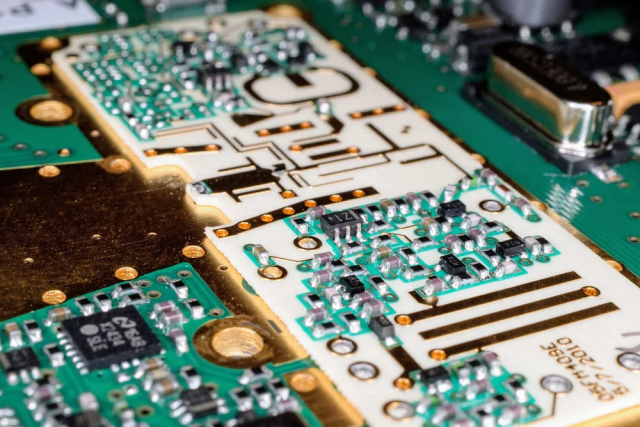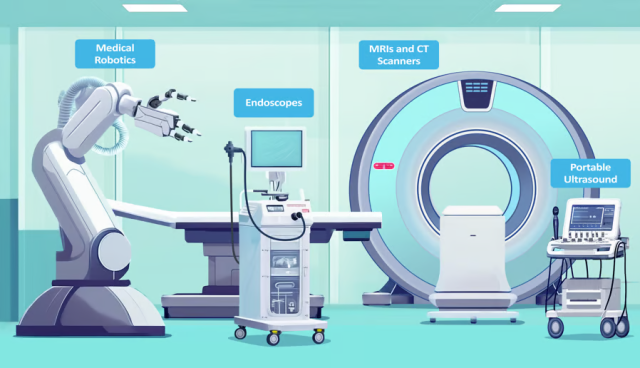1. Engineering Overview / Abstract
As medical imaging and diagnostic RF systems evolve toward higher bandwidth and multi-channel precision, the demand for phase-linear, low-loss PCB substrates becomes critical.
Megtron 6 PCB materials, with Dk = 3.3 ± 0.05 and Df = 0.002 @ 10 GHz, deliver outstanding dielectric uniformity, ensuring phase-aligned signal propagation across multiple RF channels used in MRI, CT, and ultrasound front-ends.
KKPCB leverages tight stackup impedance calibration and vacuum lamination processes to achieve stable transmission characteristics and consistent thermal behavior even under repeated power cycling and patient load conditions.

2. Technical Challenges in Medical RF Modules
| Engineering Challenge | Impact on Performance | Root Cause |
|---|---|---|
| Phase inconsistency between channels | Imaging distortion, calibration errors | Dk fluctuation or uneven lamination |
| Dielectric loss at GHz frequencies | Reduced RF sensitivity, SNR degradation | High Df and copper roughness |
| Thermal expansion mismatch | Misalignment of RF paths under operation | CTE imbalance between copper and dielectric |
| Moisture ingress during sterilization | Drift in dielectric performance | Absorption in glass-reinforced layers |
In medical RF boards, signal accuracy depends on synchronous phase behavior and consistent impedance, especially across multi-layer interconnects used in MRI gradient drivers and RF amplifiers.
3. Material Science and Dielectric Properties of Megtron 6
| Property | Typical Value | Benefit |
|---|---|---|
| Dk | 3.3 ± 0.05 | Tight impedance tolerance for multi-channel alignment |
| Df | 0.002 @10GHz | Low insertion loss across RF paths |
| Tg | > 200°C | High reflow and thermal stability |
| CTE (Z-axis) | 45 ppm/°C | Maintains via integrity during sterilization |
| Moisture Absorption | 0.06% | Stable performance in high-humidity environments |
Compared with PTFE-based laminates, Megtron 6 PCBs offer superior mechanical robustness and controlled dielectric consistency, enabling both high frequency operation and manufacturability in dense medical electronics.

4. KKPCB Case Study — MRI Gradient Amplifier RF Control Board
Client & Application Context
A North American medical imaging OEM required a 16-channel RF control board for MRI gradient amplifiers operating between 500 MHz and 5 GHz.
Engineering Problem
Previous polyimide-based substrates showed 3–5° phase mismatch between adjacent channels, causing image reconstruction artifacts and RF drift.
-
Implemented 4-layer Megtron 6 core + FR-408HR hybrid stackup
-
Applied vacuum lamination under controlled CTE balance (Δ< 5 ppm/°C)
-
Used rolled copper (Ra < 1.0 µm) to reduce conductor loss
-
Calibrated impedance to 50 Ω ± 3% via inline TDR
Measured Results
| Parameter | Target | KKPCB Result |
|---|---|---|
| Phase Mismatch @ 2.4 GHz | < ±2° | ±1.1° |
| Insertion Loss @ 5 GHz | < 0.3 dB | 0.26 dB |
| Impedance Variation | ±5% | ±2.8% |
| Thermal Drift | < 0.5° | 0.3° |
Result:
The KKPCB-engineered Megtron 6 PCB achieved phase-coherent performance and stable impedance uniformity, supporting precise magnetic field control and imaging accuracy in MRI systems.
5. Stackup and RF Implementation
Stackup Configuration (4-layer hybrid)
- Top Layer — Signal (Megtron 6, 0.2 mm)
- Inner Layer — Ground reference (rolled copper)
- Inner Layer — Control (FR-408 HR)
- Bottom Layer — Power plane
Design & Validation Methods
-
HFSS Simulation: Verified electric field uniformity (<1.5% deviation)
-
ADS Simulation: S11 and phase ripple maintained <0.2° up to 5 GHz
-
VNA Calibration: 0.27 dB insertion loss @ 4.8 GHz over 200 mm trace
Thermal Performance:
Thermal via arrays and CTE-controlled stackup reduced local hotspot temperature by 8.4°C under continuous 1.2 W/cm² RF load.
6. Environmental & Reliability Validation
| Test | Condition | Result |
|---|---|---|
| Thermal Cycling | –55°C ↔ +150°C, 1000 cycles | No delamination or via deformation |
| Humidity Aging | 85°C / 85%RH, 1000 h | Df drift < 0.0001 |
| Sterilization Endurance | 135°C steam, 30 cycles | No dielectric swelling |
| Mechanical Bending | 2 mm deflection | No impedance change |
7. Conclusion — Engineering Reliability Integration
Megtron 6 PCB platforms deliver phase stability, mechanical strength, and dielectric uniformity, making them ideal for medical imaging RF modules.
Through KKPCB’s hybrid stackup engineering, precision lamination, and RF validation workflows, these PCBs ensure long-term reliability and signal coherence, supporting diagnostic accuracy and system longevity.
8. Contact / CTA
Contact KKPCB Engineering for advanced Megtron 6-based PCB design, stackup modeling, and environmental validation for medical, 5G, and industrial RF systems requiring sub-degree phase alignment and low-loss interconnects.

